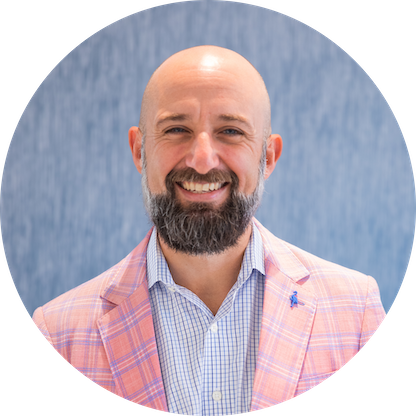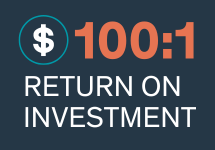
Featuring:
Sharon Line Clary
VP, Strategic Marketing and Communications
AdventHealth

Featuring:
Anthony Cadieux
Exec Director Performance Marketing Strategy
AdventHealth
As more and more people become savvy consumers of healthcare services, healthcare marketers are racing to reach and engage individuals… while using a smaller and smaller portion of budget dollars. Using precision marketing and taking advantage of large amounts of patient data, healthcare marketers can fine-tune and hyper-personalize their communications. Directly targeting each individual as opposed to broad patient segments maximizes contribution margins as well as ROI.
Sharon Line Clary and Anthony Cadieux from AdventHealth are taking on this challenge directly. They have introduced precision marketing into their overall marketing efforts, using advanced analytics, personalized content, and innovative digital channels to reach individuals the way they want to be reached. The following Q&A details their journey into precision marketing and how they have transformed their ROI using these innovative techniques.
Tell us about your respective roles at AdventHealth.
Sharon: I oversee strategic marketing communications, which includes traditional marketing in addition to partnering with Anthony on digital marketing, partnerships, communications, and physician relations.
Anthony: I'm part of the corporate services team, supporting corporate-led initiatives. We're fully integrated with Sharon’s team and deploy digital strategies to support their overall initiatives.
What is precision marketing and how does it work for health systems?

Sharon: Precision marketing enables us to find the people who are most likely to need our services. Then we can engage and reach out to them with the services they need using messaging that will resonate. It's been highly successful for us.
Anthony: There are three layers we look at with precision marketing at our health system.
- How likely is someone to have a particular condition or health need?
- How likely are they to engage in care?
- How likely are they to choose AdventHealth?
We look at each of these layers to build patient segments and connect with those people directly online as well as some direct mail. Precision marketing is moving away from more of the contextual and broad persona-based work and instead addressing people on an individual basis.
What are the barriers to precision marketing?
Sharon: Because precision marketing is so hyper-personalized, you must have the right structure in place. You can't just start tomorrow and think it can be done easily. You have to develop a number of different creative pieces. For example, just for our pilot we created 160 different types of creative that were used based on different criteria. That's not an easy lift.

Anthony: Precision marketing is not an inexpensive investment. When proposing this to a CFO or a CEO, they might look at this and say, "Well, it sounds like these other marketing programs are less expensive. So why would you spend more?" Thankfully Sharon was able to overcome that hurdle. After launching the initiative we looked at the ROI, and it proved itself. Now we’re looking at precision marketing as an investment model rather than an expense model.
How do you show ROI for precision marketing? What core metrics do you use?
Anthony: Our finance partners are particularly interested in net revenue and return on marketing investment. We collaborated with finance and made some accommodations around how we would have typically reported on marketing attribution and ROI.
To develop this ROI metric, we created some pretty sophisticated algorithms. We spent about 18 months just creating the financial models with the analytics team by looking at multiple data points and engagement across all service-lines. We use two methods for attribution: last touch attribution and multi-touch attribution. Partnering with finance and other leaders gave us the stamp of approval in our marketing ROI and attribution reporting.

How do you balance hyper-personalization with privacy concerns in healthcare?
Sharon: We have not found that to be a conflict. Our entire campaign always looks like our brand. And it's very approachable. Hyper-personalization means speaking with the consumer using the messaging they want, so they see it as a benefit.
Anthony: Additionally, the data backs that up. More and more, consumers want to be spoken to directly. They want personalized communications. Every other retail touchpoint is speaking to them on that level. So when they don't get that level of personalization, it's such a contrast.
What lessons or pitfalls have you learned from your precision marketing programs?
Sharon: It works! When we started, we had 11 cohorts being targeting with different messaging. We identified which of those cohorts were driving the most business for the services lines we were promoting. That allowed us to refine and optimize our campaigns.

We learned that the duration of the program matters – in fact it’s critical. You need to have really clear, strong call-to-actions. And when you can, tailor those CTAs to the target audience.
The biggest pitfall is that you have to fully invest in it. It is going to take an investment of dollars, resources, and time. We tried looking at results after a duration of three months, but we found that it took a minimum of six months to start seeing the return.
Anthony: It definitely works. We talk a lot about integrated campaigns, or developing creative that's end-to-end. In the digital landscape, health systems will sometimes repurpose landing pages for different segments. We've seen success in fully building that out and tailoring the landing page experience. Everything from landing pages to our email follow-ups is working at a patient-segment level.
What recommendations do you have for building a partnership with finance and other teams?
Sharon: We speak a different language from finance. So, we made a conscious effort to connect and discover what resonates with finance to help them see marketing as an investment. Sometimes we marketers make what we do look easy, but there's a lot of science and art behind it. Educating finance and bringing them in as part of the team has been a game-changer for us. I've even recommended that my team find mentors in finance, people they can run conversations by to make sure they are resonating.
We also worked with business development, strategy, and operations. Our emergency team was very involved in ensuring that our messaging was clinically sound. The beauty of precision marketing is you can be nimble. You want to be constantly optimizing and learning from the data, so there should be just a few key people who can rapidly approve things.
Give me an example of one of your most successful precision marketing campaigns and what you learned.

Anthony: By far the most successful campaign has been our emergency department (ED) campaign. The return on investment was 100:1. We wanted to build awareness around the ED and ensure the call-to-action was customized to each patient segment. Sharon talked earlier about starting with 11 cohorts, but that's at the highest level. Within each of those segments, we layer communications based on different factors – it could be location, race, gender, family composition, etc.
We started piloting precision marketing in October of 2019. Then COVID hit, and we had a small pause, because obviously we weren't trying to drive more folks to the ED during that time. But as things leveled off, we introduced the Concern Index to understand the degree of people's fear about coming to the ED. We also did some proprietary research around people's overall level of comfort with going to healthcare facilities and EDs. Even as COVID cases leveled off, we then needed to address individuals to say, "It's safe to come in." With our messaging and precision marketing, we were able to address those specific, psychological concerns that people had. It ended up helping level our volume during a time where some of our competitors were struggling.
Sharon: We're continuing to learn as we go. For example, we only did our obstetrics campaign for three months. That’s not enough time for someone who is looking to get pregnant or is pregnant. I think finding the right places to use precision marketing is critical. Some campaigns are just going to yield different returns depending on the strategy.
Given the success, we’re working to expand this strategy across our entire company. We created this consumer campaign around “clean and safe” and mirrored this inside our facilities. We added that to all of our precision marketing efforts.
Listen to the full Hello Healthcare podcast interview with Sharon and Anthony on your preferred streaming platform or watch the full video interview below.
About Sharon Line Clary
Sharon Line Clary is a senior marketing professional with over 25 years of experience in marketing and business development. She has deep expertise in the healthcare landscape, having worked for Florida Hospital for 20 years prior to her time at AdventHealth. Sharon has been working at AdventHealth in marketing and communications for over seven years. Connect with Sharon on LinkedIn.
About Anthony Cadieux
Anthony Cadieux has been working at AdventHealth for over six years. As a performance marketing executive, Anthony leads digital marketing strategy, digital media, search engine optimization, marketing analytics, and more for the Orlando-based health system. Anthony has over 19 years of marketing experience focused on accelerated revenue growth. Connect with Anthony on LinkedIn.

